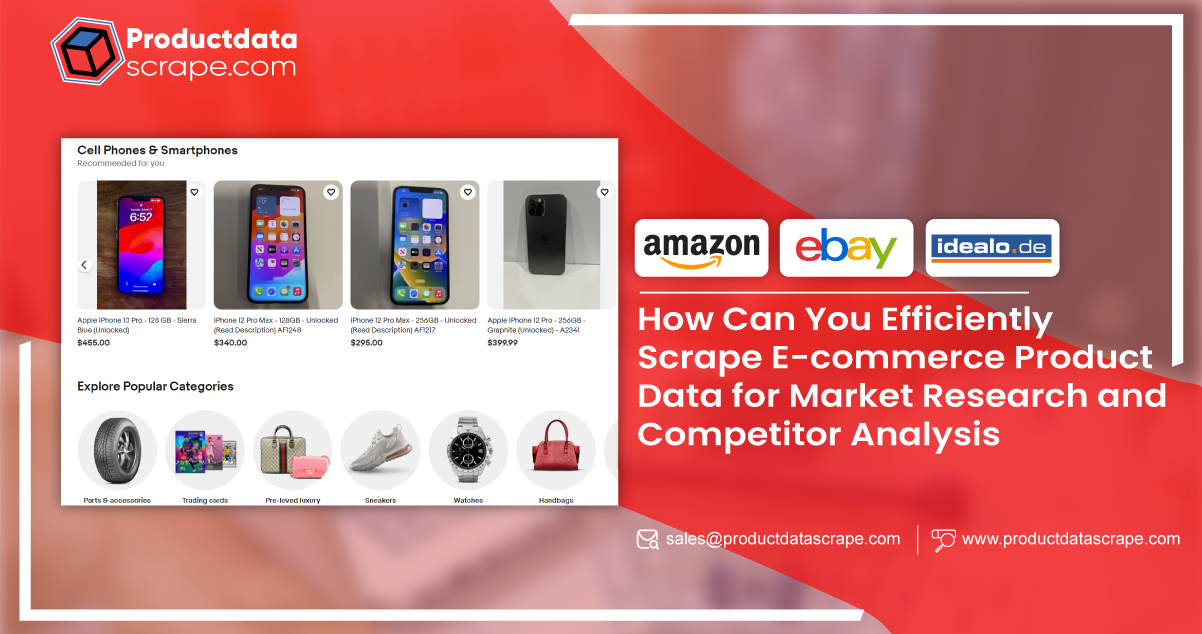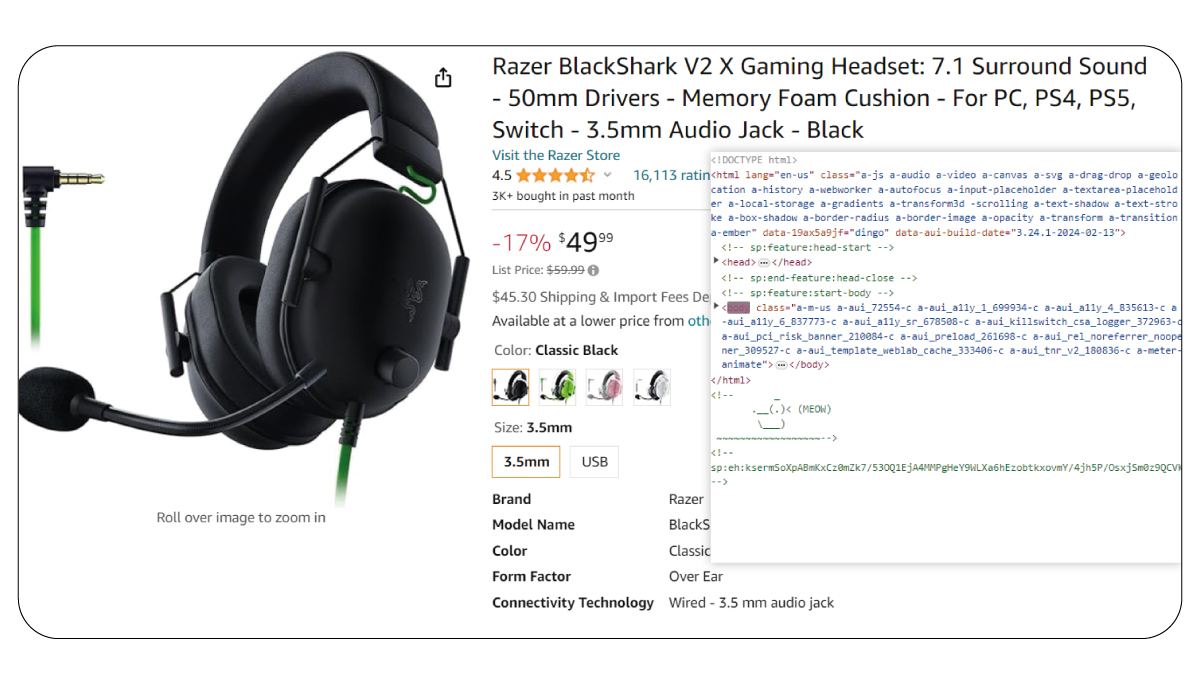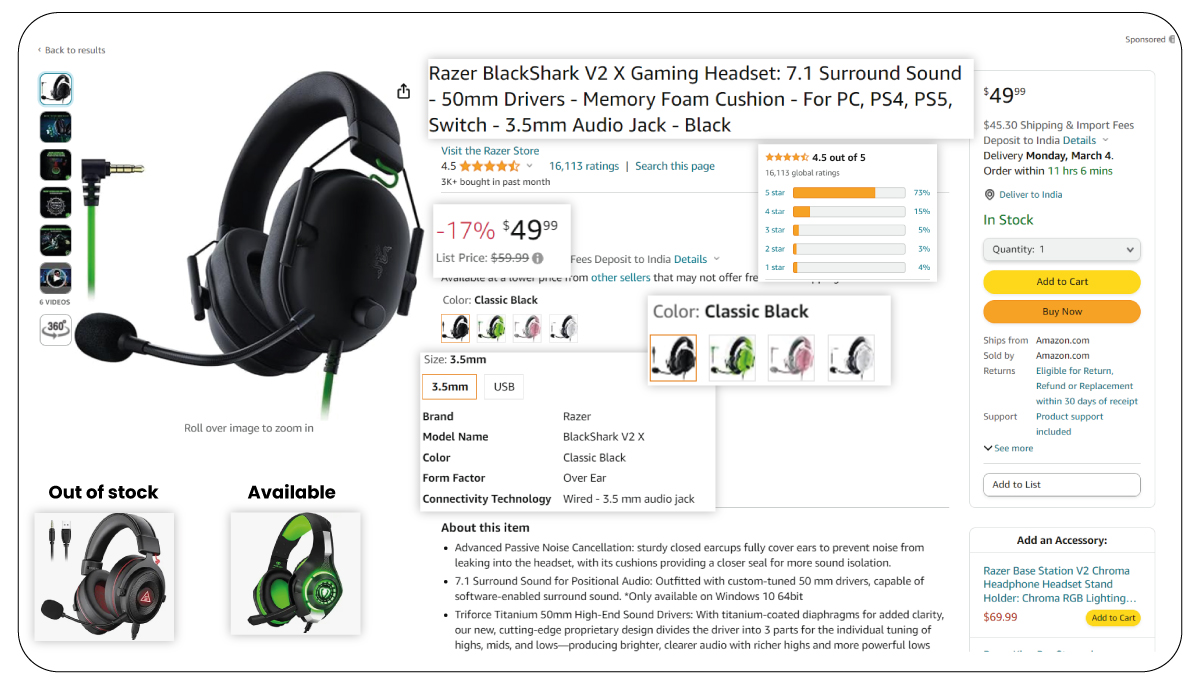
In e-commerce, using e-commerce data scraping services has become indispensable for businesses seeking to extract valuable insights from the vast array of online data. These services enable the automated extraction of data from various e-commerce platforms, including product listings, pricing information, customer reviews, and competitor data. By leveraging e-commerce data scraping, businesses can attain a cutthroat edge by analyzing market trends, monitoring competitor strategies, optimizing pricing strategies, and enhancing overall decision-making processes. However, businesses must handle the ethical and legal considerations for data privacy and intellectual property rights when employing such services. This introduction sheds light on the pivotal role of e-commerce data scraping services in today's digital marketplace, emphasizing their potential to drive business growth and innovation while highlighting the need for responsible and ethical data usage practices.
Understanding E-Commerce Product Scraping from Top E-commerce Websites
Scraping E-Commerce product data from top platforms like Amazon, Alibaba, and eBay, etc., enables competitive analysis, market research, and price monitoring, providing businesses with crucial insights for informed decision-making and strategic planning in the online marketplace.
Amazon: Amazon, the world's largest online marketplace, provides a treasure trove of product data ripe for scraping. With millions of listings spanning electronics, clothing, books, and home goods, Amazon offers a prime opportunity to scrape product data. It includes invaluable insights into pricing fluctuations, customer sentiments via reviews, and competitor tactics. By scraping Amazon product data, businesses can glean actionable intelligence to inform pricing strategies, enhance customer experiences, and lead in the competitive e-commerce landscape.

Alibaba:Alibaba, a global e-commerce giant headquartered in China, is a worldwide nexus for buyers and sellers. Its expansive catalog encompasses wholesale goods, electronics, fashion items, and more, presenting a lucrative opportunity to scrape valuable product data. By scraping Alibaba product data, businesses can unlock insights into global market dynamics, supplier reliability, and evolving product demands. This data can inform strategic decisions, such as sourcing strategies, inventory management, and market expansion plans, empowering businesses to stay competitive in the dynamic e-commerce landscape.

eBay: eBay, a renowned online marketplace, boasts a plethora of products spanning collectibles, electronics, fashion, and more. Its unique auction-style listings and Buy It Now options create a varied dataset ripe for e-commerce scraping. Extracting eBay product data unveils pricing trends, seller strategies, and inventory dynamics, furnishing invaluable insights for market research and competitive analysis. By scraping eBay product data, businesses gain a strategic edge, enabling informed decisions to optimize pricing, enhance product offerings, and maximize competitiveness in the e-commerce sphere.

Idealo: Idealo, a leading price comparison website headquartered in Germany, boasts a robust European presence. Since its inception in 2000, Idealo has provided consumers a comprehensive platform to compare prices across various products, spanning electronics, appliances, fashion, and beyond. Through its user-friendly interface and expansive repository of products sourced from diverse online retailers, Idealo streamlines the shopping journey, empowering users to effortlessly search, compare prices, and make well-informed purchasing decisions. By scraping Idealo product data, businesses gain invaluable insights into pricing trends, product availability, and competitor strategies, enabling them to refine pricing strategies, optimize product assortments, and enhance competitiveness in the e-commerce landscape.

Tools and Technologies: Streamlining E-Commerce Data Scraping

Numerous scraping tools and software exist to facilitate data extraction from e-commerce websites. These tools offer various functionalities, such as web crawling, data parsing, and automation, catering to different scraping requirements and skill levels.
Several scraping methods are available, including APIs, web scraping libraries, browser extensions, and manual scraping. APIs provide structured access to data, while web scraping libraries offer flexibility in data extraction from HTML content. Browser extensions simplify scraping for non-technical users. Understanding the strengths and limitations of each method is crucial for selecting the most suitable approach.
When selecting a scraping solution, consider data accuracy, reliability, scalability, and compliance with website terms of service and legal regulations. Choosing a tool or method that aligns with your specific scraping objectives and technical capabilities is essential. Implementing scraping solutions requires careful planning, documentation, and testing to ensure efficiency and compliance with ethical and legal standards. Regular maintenance and updates are also necessary to adapt to changes in website structures and maintain scraping effectiveness over time.
Tips to Optimize Business Strategies by Scraping E-commerce Product Data

Listed below are the key tips for optimizing E-Commerce Product Data Scraping to Enhance Competitive Analysis and Market Insights:
- Competitive Pricing Analysis: Use scraped e-commerce product data to analyze competitor pricing strategies, identify price gaps, and adjust your pricing to remain competitive.
- Product Assortment Optimization: Analyze product data using an e-commerce data scraper to identify popular products, assess demand trends, and optimize your product assortment to meet customer preferences and market demand.
- Inventory Management: Utilize scraped data to monitor product availability, track inventory levels, and avoid stockouts or overstock situations, ensuring optimal inventory management and efficient supply chain operations.
- Market Trend Identification: Scrutinize e-commerce product data to identify emerging market trends, consumer preferences, and demand patterns, enabling you to adapt your business strategies accordingly and stay ahead of market shifts.
- Customer Insights: Collect customer reviews and feedback from scraped data to gain valuable insights into customer preferences, satisfaction levels, and pain points. This data benefits product development, marketing strategies, and customer service initiatives.
- Competitor Benchmarking: Scrape e-commerce product data to compare your product offerings, pricing, and customer reviews with competitors' data to benchmark performance, identify areas for improvement, and develop strategies to differentiate your brand in the market.
- Dynamic Pricing Strategies: Leverage real-time pricing data scraped from competitors to implement dynamic pricing strategies, adjusting prices dynamically based on market conditions, fluctuating demands, and competitor actions to maximize profitability.
- Marketing Campaign Optimization: Analyze e-commerce product data to identify high-performing products, target audience segments, and effective marketing channels, enabling you to optimize marketing campaigns, allocate resources effectively, and draw higher conversion rates and ROI.
Steps to Scrape Product Data from E-commerce Websites

Collecting product data from e-commerce websites involves several steps. Listed below are key processes to gather valuable insights for market research and strategy development.
- Target Identification: Identify the e-commerce platforms containing the desired product data for scraping, ensuring they align with your project requirements.
- Tool Selection: Choose a suitable web scraping tool or framework based on your technical expertise and project complexity, ensuring it can handle the task effectively.
- Website Structure Analysis: Understand the structure of the target websites, including the layout of product pages, HTML tags utilized for product information, and any navigation features present.
- Element Inspection: Utilize browser developer tools to inspect the HTML elements housing the product data for scraping, such as product names, prices, descriptions, and images.
- Logic Development: Develop scraping logic to extract relevant product data, utilizing XPath or CSS selectors to pinpoint specific elements on the page accurately.
- Pagination Handling: Implement logic to handle pagination if the target website spans multiple product listing pages, ensuring comprehensive data extraction.
- Rate Limiting: Implement rate limiting or request delays to mitigate the risk of overwhelming the website's servers and potential IP blocking.
- Testing and Refinement: Conduct thorough testing of the scraping script on a small dataset, refining the logic to address any unforeseen challenges or website layout changes.
- Execution: Execute the scraping script to collect product data from the target website, monitor the process for errors or anomalies, and make necessary adjustments.
- Data Storage and Analysis: Store the scraped product data in a structured format such as CSV or database, enabling further analysis and utilization for business insights or decision-making.
- Compliance: Adhere to the terms of service and scraping guidelines of the target websites, ensuring compliance with legal and ethical standards throughout the scraping process.
Conclusion:Scraping e-commerce product data offers businesses a powerful tool for gaining valuable insights, optimizing strategies, and driving growth in the competitive online marketplace. Businesses can systematically extract product information from various e-commerce platforms to analyze pricing dynamics, monitor competitor activity, and identify emerging market trends. This wealth of data enables informed decision-making, leading to improved pricing strategies, enhanced product offerings, and increased competitiveness. However, it's essential to conduct scraping ethically and responsibly, respecting the terms of service of the target websites and safeguarding user privacy. With careful execution and strategic analysis, scraping e-commerce product data can unlock untapped opportunities for business success.
At Product Data Scrape, our commitment to unwavering ethical standards permeates every aspect of our operations. Whether delivering Competitor Price Monitoring Services or engaging in Mobile App Data Scraping, our global presence across multiple offices ensures the steadfast delivery of exceptional, transparent services. We tailor our offerings to meet the diverse requirements of our esteemed clients, aiming for consistent excellence in every service provided.








































.webp)






